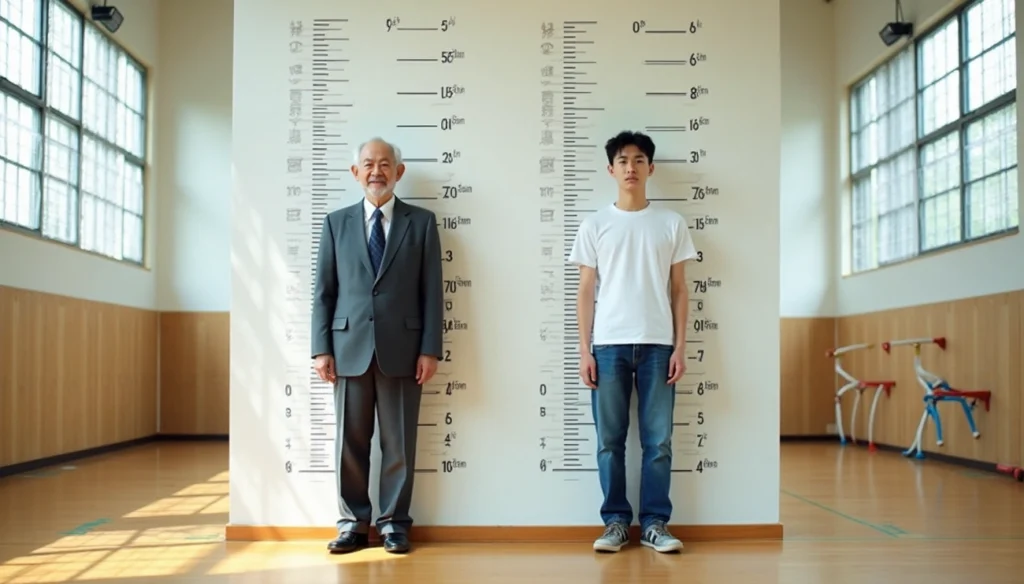Japan Average Male Height Myth: What Research Actually Shows

Table of Contents
When you think about japan average male height, what number comes to mind? You might be surprised to learn that as of 2023, the average male height in Japan is approximately 171 cm (5 feet 7 inches). Many people hold misconceptions about the japan average male height, often believing Japanese men are significantly shorter than they actually are.
According to recent studies, the average height of Japanese men has remained relatively stable in recent years. While examining the average male height in Japan, researchers have found that adult Japanese males stand at around 170.8 cm (5 feet 7.2 inches). This puts the average height male Japan measurement in perspective when compared to other countries. For instance, the average male height in the United States is about 177 cm (5 feet 8 inches). Interestingly, some sources suggest that what is the average male height in Japan might actually be decreasing, though this claim requires careful examination.
Throughout this article, you’ll discover the facts behind the japan male average height statistics, explore whether the average japan male height is truly declining, and understand the health and genetic factors that influence height in the Japanese population. By the end, you’ll have a clear picture of what research actually shows about this often misunderstood topic.
Is the Average Japan Male Height Really Declining?
Contrary to popular belief, research shows the japan average male height has not been steadily increasing in recent decades. A groundbreaking study by researchers at the National Center for Child Health and Development in Tokyo revealed that the average male height in japan has actually been declining for those born after 1980. This finding challenges the common assumption that heights continuously increase with improved living standards.
The average height of Japanese men peaked among those born in 1978-1979, reaching 171.46 cm. Subsequently, this figure decreased to 170.82 cm for men born in 1996—a reduction of 0.64 cm from the peak measurement. This decline, although modest, represents a reversal of the previous trend where the japan average male height had grown approximately 15 cm over the preceding century.
Furthermore, researchers identified a potential cause for this decline. The study, which analyzed data from approximately 3.15 million Japanese adults, found “a strong inverse correlation” between the rate of low-birth-weight infants and adult height. Indeed, as the japan male average height began decreasing for those born after 1980, the percentage of low-birth-weight babies (weighing 2,500 grams or less) rose dramatically—from 5.1% in the late 1970s to 9.7% by 2007.
Nevertheless, some research presents conflicting information. A 2014 study examining height data at 17.5 years of age from 1985 to 2005 concluded there was “virtually no secular height change in recent decades”. Additionally, the Japanese Ministry of Education reported that since 1994, the average height male japan measurement has remained stable at 170.9 cm.
The japan average male height situation contrasts with neighboring countries:
- South Korea and China continue experiencing height increases
- Japan’s height has stagnated or slightly declined
- Historical height increases occurred after the Meiji Restoration and post-WWII
Moreover, experts suggest multiple factors affecting the average height in japan male measurements, including genetic factors that may set a “ceiling” for Japanese height, traditional dietary patterns, and pregnancy health guidelines that previously encouraged limited weight gain during pregnancy.
Debunking the Myth: Are Japanese Men Shorter Than Before?
Historically, the japan average male height has undergone remarkable changes throughout the last century. In the early 1900s, the average height in japan male measurement was considerably lower, with men standing at approximately 160 cm (5 feet 3 inches). This historical perspective provides valuable context for understanding how dramatically the japan average male height has evolved.
Looking at precise data, in the 1930s before World War II, the average male height japan figure was about 160-162 cm. Following the war, a striking transformation occurred. By 1968, the average japan male height increased to just under 5 feet 6 inches (approximately 167.6 cm), representing a significant gain over the pre-war measurement of 5 feet 3½ inches (about 161.3 cm).
The growth continued steadily throughout the post-war period. School boys in the 6th grade grew from 129 cm in the early 1910s to 147 cm in the late 1990s. This upward trend persisted until the early 1990s, at which point the japan average male height stabilized rather than declined.
One compelling fact frequently overlooked is that despite consuming virtually no animal products before WWII, the japan male average height still increased steadily. This contradicts the common belief that animal protein consumption is the sole determinant of height growth.
Particularly noteworthy was the introduction of school lunch programs after WWII, which contributed significantly to improving the average height male japan measurements. These programs ensured children received balanced nutrition during crucial growth years.
Currently, the average male height in japan stands at approximately 171-172 cm, which essentially debunks the myth that Japanese men are becoming shorter. Instead, what research demonstrates is a pattern of dramatic growth throughout most of the 20th century, followed by stabilization in recent decades.
Interestingly, this height plateau occurred despite continuing increases in animal protein consumption, suggesting the possibility that Japanese people may have reached what some researchers call their genetic potential. Consequently, rather than viewing current heights as abnormally low, it’s more accurate to recognize that the average height in japan male measurements reached unprecedented levels before stabilizing.
Health, Height, and Genetics: What Research Actually Shows
Genetics plays a dominant role in determining the japan average male height, with scientists estimating that approximately 80% of an individual’s height is determined by inherited DNA sequence variations. This genetic influence helps explain why Japanese children typically grow to heights similar to their parents, yet siblings can still have different heights due to unique combinations of genetic variants.
Research specific to Asian populations has uncovered fascinating insights about the japan male average height. The largest genetic study on height in an Asian population revealed dozens of rare DNA variants specific to people in the region. Notably, these rare variants found in Japanese individuals are mostly linked to genes involved in increasing height, whereas rare variants in Europeans tend to constrain height.
The average height male japan measurement is affected by both genetic architecture and environmental factors. First, the genetic architecture of human height is generally similar between Japanese and European populations. Yet, scientists have successfully identified rare and low-frequency height-associated variants specific to East Asians. Hence, researchers suspect that Japanese and European populations may have experienced different evolutionary pressures in their distant past, possibly related to lifestyle differences such as staple foods.
Beyond genetics, several environmental factors impact what is the average male height in japan. A compelling study found that the declining trend in average japan male height may be attributed to increases in low-birth-weight infants. The research team at the National Center for Child Health and Development discovered “a strong inverse correlation” between the rate of low-birth-weight infants and adult height. Likewise, the ratio of low-birth-weight babies in Japan jumped from 5.1% in the late 1970s to 9.7% by 2007.
Altogether, the average height in japan male population also correlates with health outcomes. Taller adult height in Japanese men is associated with decreased risk of mortality from cerebrovascular disease and respiratory disease. Specifically, the hazard ratio for mortality from cerebrovascular disease for men under 160cm versus those over 168cm was 0.83. Therefore, understanding the complex interplay between genetics, environment, and health remains crucial for comprehending japan average male height patterns.
Conclusion
Throughout this exploration of japan average male height, you’ve discovered that many common beliefs about this topic simply don’t match scientific reality. Contrary to widespread misconceptions, the japan average male height stands at approximately 171 cm (5 feet 7 inches), which differs significantly from the shorter stature many people wrongly attribute to Japanese men.
Research clearly shows the japan average male height underwent remarkable growth during the 20th century, especially following World War II. School lunch programs, improved nutrition, and better living conditions certainly contributed to this dramatic increase. However, data indicates the japan average male height has stabilized since the 1990s, with some studies suggesting a slight decline for those born after 1980.
The apparent plateau in japan average male height challenges the assumption that heights continuously increase with improved living standards. This stabilization might reflect Japanese people reaching their genetic potential after generations of growth. Additionally, the correlation between low birth weight and adult height provides a fascinating explanation for recent subtle decreases in the average male height in Japan.
Genetic factors undoubtedly play the most significant role in determining japan average male height, accounting for approximately 80% of height variation. Scientists have identified rare DNA variants specific to Asian populations that influence height development differently than those found in European populations.
Meanwhile, the stabilization of japan average male height doesn’t necessarily indicate health problems. Japanese men continue to enjoy some of the longest lifespans globally, though research does suggest connections between height and certain health outcomes like cerebrovascular disease risk.
The next time someone mentions the japan average male height, you’ll have accurate information to share. Rather than viewing current heights as abnormally low, you can explain how Japanese male height reached unprecedented levels before stabilizing at around 171 cm. This figure reflects a complex interplay of genetics, nutrition, healthcare, and historical factors unique to Japan’s development over the past century.
Understanding these nuances about japan average male height helps dispel stereotypes and provides deeper insight into how human physical development interacts with cultural, environmental, and genetic factors. The true story of height in Japan proves far more complex and fascinating than simplified myths suggest.
Key Takeaways
Research reveals surprising truths about Japanese male height that challenge common stereotypes and misconceptions about this demographic.
• Japanese men average 171 cm (5’7″), not significantly shorter than commonly believed, with height stabilizing since the 1990s rather than declining.
• Height peaked for men born in 1978-1979 at 171.46 cm, then slightly decreased to 170.82 cm for those born in 1996.
• Genetics determine 80% of height variation, with rare DNA variants specific to Japanese populations mostly linked to increasing height.
• Post-WWII improvements in nutrition and school lunch programs drove dramatic 20th-century height increases of approximately 15 cm.
• Low birth weight correlates strongly with reduced adult height, explaining recent subtle decreases as low-birth-weight births rose from 5.1% to 9.7%.
The stabilization of Japanese male height likely reflects reaching genetic potential rather than health decline, debunking myths about continuously shrinking stature while highlighting the complex interplay between genetics, nutrition, and environmental factors in human development.
FAQs
What is the current average height for Japanese men?
As of 2023, the average height for Japanese men is approximately 171 cm (5 feet 7 inches)
Has the average height of Japanese men been decreasing?
While there was a slight decline for those born after 1980, the average height has largely stabilized since the 1990s rather than continuously decreasing.
How does genetics influence height in the Japanese population?
Genetics plays a dominant role, accounting for about 80% of height variation. Researchers have identified rare DNA variants specific to Japanese populations that are mostly linked to increasing height.
What factors contributed to the increase in Japanese male height during the 20th century?
Post-World War II improvements in nutrition, including school lunch programs, and better living conditions led to a significant increase in average height, with Japanese men growing approximately 15 cm taller over the century.
Is there a correlation between height and health outcomes for Japanese men?
Yes, studies have shown that taller Japanese men have a decreased risk of mortality from certain conditions, such as cerebrovascular and respiratory diseases, compared to shorter men.
